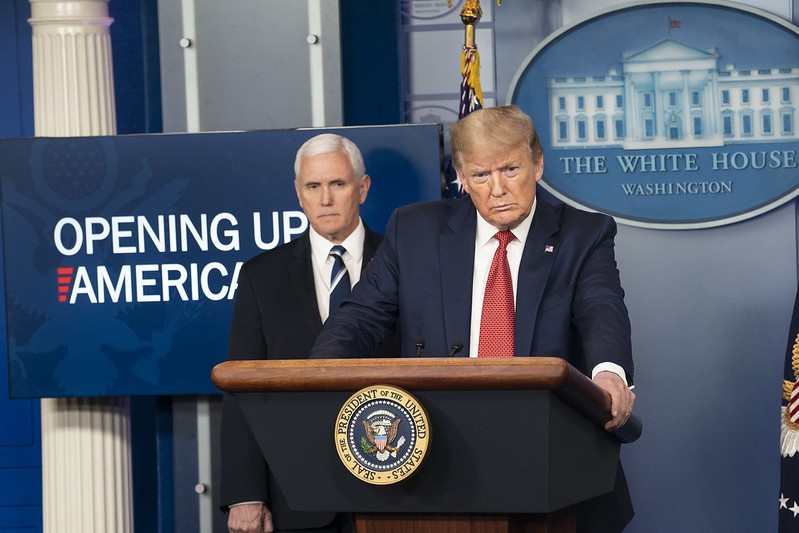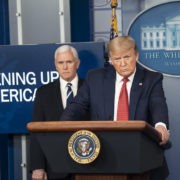
WITHOUT the constitutional authority to do so, President Donald Trump on Friday, May 22 “ordered” state leaders to allow churches and places of worship to open immediately, starting last Sunday.
This came after asking the Centers for Disease Control and Prevention (CDC) to hold off the publication of guidelines that will help them safely re-open.
White House officials told the Washington Post that Trump did not want to displease the evangelical ministers who have been supporting him, and so the CDC was made to modify the guidelines without consultation with church leaders on the real health and safety concerns.
“If they don’t do it, I will override the governors,” Trump threatened.
After Trump’s bizarre announcement, church leaders have been sharing their perspectives on the issue as the world continues to fight the war against COVID-19, which, has infected more than 5.495 million people and killed 346,232 and counting, as of press time on Tuesday, May 26.
Let me share with you some of these perspectives and may they help you in your discernment on what to do as true Christians.
“Bishops from the Washington State Catholic Conference: “We will wait.”
”We want to let you know the public celebration of Mass was suspended, not out of fear, but out of our deepest respect for human life and health,” reads a Friday statement signed by several bishops in a “unified response.”
“While we share the desire to bring people back to Mass as quickly as possible, we will wait to schedule our public worship when it is safe and we are prepared to do so,” the statement read.
The bishops’ statement added that the state conference follows guidance from the U.S. Conference of Catholic Bishops and the Thomistic Institute, along with public health experts, and that is working to develop a plan with Washington Gov. Jay Inslee (D) for a safe reopening.
“Parishes must create an environment that is not only safe, but is liturgically reverent,” the bishops said, adding that there is no current date established for Mass gatherings resuming in the state.” (As reported by The Hill)
“Mr. President, we don’t need to open churches to practice our faith…”
“Who says that religious organizations haven’t already been providing ‘essential’ services without this presidential ‘blessing?’ I am a Roman Catholic priest in the Passionist Community serving, at the moment, in New York. During this pandemic I have buried the dead at cemeteries — with limited family members present. I have prayed with people via FaceTime and Zoom. I even heard a confession in a supermarket parking lot.
“Priests with whom I live have blessed the sick and dying in hospitals and nursing homes. We have also celebrated virtual Masses and prayer services for countless of the faithful.
“The churches in my area have been open for individual prayer, Benediction services and Stations of the Cross, and social distancing is strongly encouraged. Priests have even paraded in processions in neighborhoods with the Blessed Sacrament in order to bring elements of the church service out to the faithful. Similarly, rabbis and imams whom I know have been doing the equivalent with their respective religious congregations. That is all ‘religious service.’
“What most of us have not done is put ourselves and our parishioners in danger by gathering in large groups for Mass or other religious services ‘as usual.’ That would have been — and would continue to be, in this time of contagion — irresponsible and sinful. It would also violate the right to life of many. Yes, responsible action with regard to religious organizations during this pandemic is a right-to-life issue. This is a right that needs to apply to those who live after birth, too.” - Fr. Edward Beck, interviewed on CNN
“Dear Trump, your call to allow all churches to reopen was dangerous. Sincerely, two evangelicals.”
“Before any church opens its doors, leaders must spend time setting up policies and guidelines that protect those who will be in attendance using the best science and guidance available.
“As leaders who have navigated pastors through natural disasters in the past, we provided a checklist for reopening churches. For instance, we recommend churches reach out to their insurance company to make sure they aren’t putting their congregation financially at risk. Churches also need to be able to secure proper sanitation supplies that would help prevent the possible spread of the coronavirus.
“Leaders need to recruit and train volunteers to guide the reopening process, such as helping with social distance measures. Leaders especially need to communicate to attendees about possible policy or procedural changes, such as how Communion might look different.
“We encourage faith leaders to look to the Centers for Disease Control and Prevention, which has new guidance, for how best to respond. We have also regularly encouraged church leaders to look to local officials and authorities, including public health agencies, for direction.
“Unfortunately, public health guidance from the federal government has been confusing. Early draft guidelines for houses of worship that were direct and concrete ultimately were shelved after much debate in the White House and replaced with less concrete guidelines on Friday. For example, the new guidelines do not make recommendations about important questions pastors are navigating, such as whether singing is safe or logistics of how people should gather in the building.
“Friday’s announcement makes it harder for leaders to look to federal agencies as trusted resources based on how Trump already has used his executive authority. He has minimized voices who hold differing views (such as suppressing earlier CDC guidelines for faith communities), he goes against current medical knowledge by saying he would take malaria medication that scientists have warned against using to treat the virus, and he refuses to wear face masks in public.
“Trump’s pronouncement corrupts our country’s ability to respond justly to this pandemic by putting politics over public health. The purpose appeared to be aimed at reaching evangelicals and Catholics, who will be valuable voters in the coming election.
“Several faith leaders we have spoken with say people in their congregations, who already are under emotional strain, express a range of opinions about wanting to come back to church buildings. Some will stay away until there is a vaccine, and some want to be (or have been) back the minute it’s possible.
“If we gather and cause community outbreaks, as happened in a large church in South Korea, and this week here in the United States in Georgia, Texas and Arkansas, it risks people’s lives. We must care for others in how we reopen.
“In some places in the country, starting to gather in person can be done cautiously, wisely and with joy. Those of us who live in areas where caution remains high can continue to be creative in worship, in supporting each other, and in serving our community. If we choose to emphasize the impact on our rights over the public health impact of our gathering, we diminish our love for our neighbor.
“As the Apostle Paul once wrote, ‘I have the right to do anything,’ you say — but not everything is beneficial. ‘I have the right to do anything’ — but not everything is constructive.’
“During the states’ lockdowns, many Christians expressed frustration at seeing liquor stores remain open and categorized as “essential” while houses of worship had to close their doors. Of course houses of worship remain crucial to the lives of many people and provide key resources to their communities. Churches are absolutely essential, but gathering in person is not yet.” -Kent Annan and Jamie Aten in the Washington Post (Kent Annan is director of Humanitarian & Disaster Leadership at Wheaton College. Jamie Aten is founder and executive director of the Humanitarian Disaster Institute at Wheaton.)
“All these preventive actions are ways of caring for the other person–that is, ways of loving.”
“Churches are indeed essential for Christians and the desire to worship together is a holy desire. But holy though your desire may be, it’s not just about you and your desire. It’s about protecting the other person, especially if you are, like many people, asymptomatic. Wearing masks, maintaining social distance, and even not gathering in churches, protects the other person.
“There have already been confirmed cases in Texas and Minnesota where Catholic churches have opened and the priests were found to have been unknowingly infected. Coming into contact with their parishioners, and exposing them to infection, may end up causing death……especially among the most vulnerable–the elderly, who are in many denominations the majority of churchgoers.
“I’m not sure why this is so hard to understand. If you have the measles and a doctor tells you, “Don’t go to church because you might infect a woman who is pregnant,” you don’t rail at your doctor for “impinging on your freedom. What does the loving person do? You listen to the doctor, and stay home, even though it’s a sacrifice, as a way of protecting the other person. All these preventive actions are ways of caring for the other person — that is, ways of loving.” -James Martin, SJ on Twitter
(Jesuit priest, editor at large @Americamag, author of ‘Jesus: A Pilgrimage’ and ‘Building a Bridge,’ consultor to the Dicastery for Communication @VaticanNews)
* * *
Gel Santos Relos has been in news, talk, public service and educational broadcasting since 1989 with ABS-CBN and is now serving the Filipino audience using different platforms, including digital broadcasting, and print, and is working on a new public service program for the community. You may contact her through email at gelrelos@icloud.com, or send her a message via Facebook at Facebook.com/Gel.Santos.Relos.





